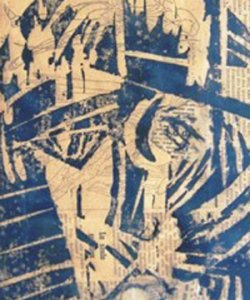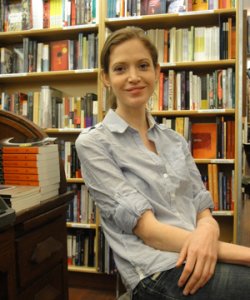Q&A: Jim Tierney’s Inspired Illustrations

A day after he finalized the last of his illustrations for our January/February 2011 issue, Jim Tierney, an illustrator and designer at Penguin, spoke about the inspiration behind his work.
Jump to navigation Skip to content
Articles from Poet & Writers Magazine include material from the print edition plus exclusive online-only material.

A day after he finalized the last of his illustrations for our January/February 2011 issue, Jim Tierney, an illustrator and designer at Penguin, spoke about the inspiration behind his work.
Small Press Points highlights the happenings of the small press players. This issue features Solid Objects, the New York City–based independent press that publishes "short, self-contained works that might not otherwise find their way into book form because of their length."

A pen-and-ink drawing and a typewritten letter by Charles Bukowski are two pieces among the documents and ephemera currently on view in Charles Bukowski: Poet on the Edge at the Huntington Library in San Marino, California.

Portraits of Henry Miller “as a demon” and Guillaume Apollinaire, two of the thirty pieces featured in Beyond the Words: Author Portraits by Carl Köhler, currently on exhibit at the University of Chicago’s Joseph Regenstein Library.

Staring down a disorder that prevents her from recognizing faces offers ample material for a memoir, but Heather Sellers tackles much more in You Don't Look Like Anyone I Know.

In the sixth installment of our series Inside Indie Bookstores, contributor Jeremiah Chamberlin travels to New York City to speak with Sarah McNally, owner of McNally Jackson Books.
Literary MagNet chronicles the start-ups and closures, successes and failures, anniversaries and accolades, changes of editorship and special issues—in short, the news and trends—of literary magazines in America. This issue's MagNet features Pleiades, Nashville Review, Sycamore Review, One Story, the Oxford American, the Awakenings Review, Fairy Tale Review, and Bound Off.
Small Press Points highlights the happenings of the small press players. This issue features Sidebrow, the San Francisco–based independent press that publishes "works by multiple authors who aren’t timid about crossing genre boundaries."
The Virginia Quarterly Review was rocked by the July 30 suicide of its managing editor, Kevin Morrissey, leaving the award-winning magazine’s future in doubt, as well as that of its editor.
A look at the retro text editors and Web applications that more and more writers are using to roll back the reach of new media.
With so many good books being published every month, some literary titles worth exploring can get lost in the stacks. Page One offers the first lines of a dozen recently released books, including Leslie Marmon Silko's The Turquoise Ledge and Julia Franck's The Blindness of the Heart, as the starting point for a closer look at these new and noteworthy titles.
The new Lit Mag Adoption Program is designed to introduce journals into creative writing course curricula and engage student writers as readers and members of a national literary community.
A survey of professional opinions, including those of the New Yorker's Paul Muldoon and the Southern Review's Jeanne Leiby, about the Paris Review's decision to reject previously accepted poems.

Contributor Jeremiah Chamberlin profiles indie innovator Dzanc Books, which in four short years has gone from a start-up to a publisher with five imprints, three literary magazines, and a list of over fifty titles.

When is the best time in your career to look for representation, and when should you call off an author-agent relationship? Terra Chalberg, whose clients include Lori Ostlund and Glenn Taylor, tackles these questions and more.

In the fifth installment of our series Inside Indie Bookstores, contributor Jeremiah Chamberlin travels to Denver to speak with Joyce Meskis, owner of Tattered Cover Book Store.
In response to the Deep-water Horizon oil spill, writers Heidi Lynn Staples and Amy King created Poets for Living Waters, an online poetry forum featuring works written in response to the disaster, spurring a host of nationwide events that give poets not only an opportunity to take action against the catastrophe but also to speak out in support of our natural environment.
The top ten low-residency MFA programs in the United States, plus a ranking of the additional thirty-six low residencies in the United States and beyond.
Size, funding, cost of living—there's plenty to consider when choosing a postgraduate creative writing program. In our second annual ranking of the top fifty MFA programs, contributor Seth Abramson measures sixteen distinct program features for the 148 full-residency programs in the United States, Canada, and New Zealand, and eight features for each of the 46 low-residency programs around the world.
With so many good books being published every month, some literary titles worth exploring can get lost in the stacks. Page One offers the first lines of a dozen recently released books, including Paul Murray's Skippy Dies and Ai's No Surrender, as the starting point for a closer look at these new and noteworthy titles.
Despite the financial challenges of their vocation, writers have long found accessible, inventive ways to get work into the world. Among the benefit readings and bake sales, a new fund-raising option allows writers to tap into the fertile social networking landscape to find individuals who may be willing to donate the cost of a cupcake to give a project a boost.
In this regular feature, we offer a few suggestions for podcasts, smartphone apps, Web tools, newsletters, museum shows, and gallery openings: a medley of literary curiosities that you might enjoy.
In June the San Francisco–based nonprofit Internet Archive partnered with several libraries across the country to allow e-book lending, taking the next step toward creating a one-stop online portal for digital reading and offering a hint of the new role libraries may play as the screen displaces the printed page.
Small Press Points highlights the happenings of the small press players. This issue features the new independent poetry press Birds, LLC, whose editors say an integral part of their mission is to build close relationships with authors and their work.